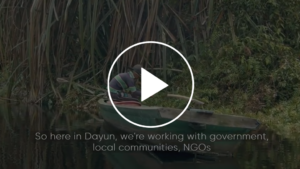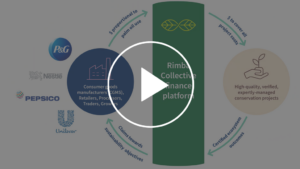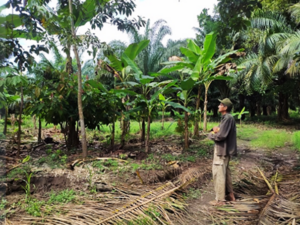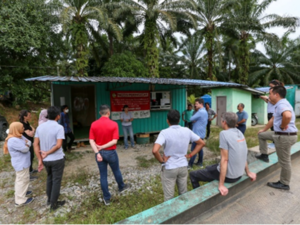As brands and retailers, consumer goods companies rely on forest ecosystems to provide essential commodities, along with the millions of people employed in global supply chains who live and work in forests. However, they are often far away from the landscapes and regions where these commodities are sourced. To transform the consumer goods industry to forest positive and meet emerging targets, including the COP15 Global Biodiversity Framework’s 30×30 goal, businesses need to look beyond their individual supply chains to ensure these landscapes can both survive and thrive.
Through engagement and collaboration with place-based initiatives, businesses and their foundations can help support and drive action on the ground to end commodity-driven deforestation and achieve positive impacts for climate, people, and nature. This area of action is a key part of the Forest Positive Coalition of Action’s strategy to create a forest positive future for the consumer goods industry. At COP26, the Coalition launched its ambition to take collective action in production landscapes and help transform them to forest positive, meaning businesses practice deforestation- and conversion-free agricultural production while actively supporting thriving natural environments, resilient forest communities, a carbon-free climate, and responsible business growth.
To achieve this ambition, Coalition members are individually and collectively engaging in production landscapes by supporting jurisdictional- and landscape-level initiatives driving the transformation of agricultural practices to forest positive. In doing so these initiatives are also supporting sustainable forest livelihoods, protecting precious natural resources, and contributing to decarbonisation efforts.
In 2022, Coalition members reported collective investments in dozens of programmes focused on driving forest positive production of palm oil; soy; paper, pulp, and fibre-based packaging (PPP), and beef. Many of these programmes are among the 22 initiatives the Coalition identified as key drivers of forest positive transformation in their respective landscapes based on a set of Ten Principles for Collective Action in Production Landscapes.
Notably, the principles recognise the importance of driving positive outcomes for all life on earth – people, animals, and nature alike. To mark International Day of Forests, the theme of which for 2023 is ‘forests and health’, here are some of the initiatives Forest Positive Coalition members are supporting and how they are creating landscapes that are #ForestPositiveForAll.
Brazil
In Mato Grosso, Jerónimo Martins and Nestlé are working with Instituto de Pesquisa Ambiental da Amazonia (the Amazon Environmental Research Institute, or IPAM) to develop a local governance model that enables the implementation of the state’s groundbreaking PCI (Protect, Conserve, Include) approach, which sets jurisdictional targets with 2030 goals to increase the sustainable production of commodities, conserve forests and include family farmers and indigenous people.
Similarly, Carrefour, METRO AG, and Nestlé are investing in a project led by Conservation International Brazil in partnership with EMBRAPA in the Tocantins state to build the capacity of 53 rural producers and 40 rural extension experts on almost 60,000 hectares for implementing Low-carbon, regenerative soy and beef farming practices. In doing so, the project helps farmers improve their land use practices to help restore and conserve degraded land. In addition, by facilitating workshops with local financial institutions and disseminating information on climate finance opportunities, the project aims to increase producers’ financial stability by creating incentives for improved access to credit.
In a new, 11-million USD venture to promote sustainable soy production in the Cerrado, Sainsbury’s and Tesco are two of the three main contributors to the Responsible Commodities Facility (RCF) operated by SIM. The RCF will provide financial incentives to farmers that commit to DCF practices, starting with 32 farms in the Cerrado in its first phase. Through participation in the RCF, farmers will conserve approximately 10,000 ha of native vegetation over the next four years.
Above right: Click on the image to learn about the RCF.
Indonesia
Mars, Mondelēz International, PepsiCo, Unilever, and the Walmart Foundation are supporting the Coalition for Sustainable Livelihoods (CSL) in Aceh and North Sumatra. CSL members work together to find solutions and demonstrate positive impacts for livelihoods and forests by strengthening coordination and communication across stakeholder groups, facilitating shared learning to replicate and scale successful models, and encouraging improved integration of livelihoods, production, and conservation across current initiatives. Through this approach, the CSL aims to enhance collaboration and collective action to achieve common objectives for strengthening smallholder livelihoods, sustainable production, and conservation in Aceh and North Sumatra.
Also in Aceh Singkil, General Mills and Nestlé are among a group of companies investing in Musim Mas’ Smallholder Hub Programme designed to help include independent smallholders in the critical Leuser ecosystem into Indonesia’s sustainable palm oil supply chains. Thus far, the projects have provided capacity-building education on sustainable agricultural practices, financial literacy, and no deforestation, peat or expansion (NDPE) to 75 illage extension officers and who with the assistance of Musim Mas Field staff have then trained 1050 smallholders in Aceh Singkil.”

Also in Siak, Asia Pulp & Paper, Nestlé, and Sodexo are working with Winrock International to support the sustainable peatland management of land reallocated to local communities as part of Indonesia’s TORA agrarian reform programme (Tanah Obyek Reforma Agraira). The programme will improve the quality of land, help reduce peat fire and land subsidence in a 4,000 hectare environment and its surrounding areas; improve the livelihoods of 4,000 farmers; and help increase food security in local communities by promoting local sustainable wetland-friendly commodities.
Across Indonesia, Nestlé, PepsiCo, Procter & Gamble, and Unilever are the Founding Partners, with Lestari Capital, of the Rimba Collective. Starting in Indonesia, Malaysia and Papua New Guinea, the Collective aims to provide US$1 billion to protect or restore 500,000 hectares of forest, supporting 32,000 individuals in forest communities in Southeast Asia over 30 years. In its first year since launch, the Collective has funded over 75,000ha of conservation and restoration projects within its portfolio, whose projects span across 21 areas of critical importance to securing forest protection in deforestation-risk areas. The scale up continues with 200,000ha of projects to be included by the end of 2023. The Collective aims to welcome new Partners in 2023 from across the supply chain to continue momentum and ultimately go above and beyond its initial target of 500,000ha.
Above right and left: Click on the images to learn about the Siak Pelalawan Landscape Programme and the Rimba Collective.
Mexico
In La Encrucijada Biosphere Reserve and Marques de Comillas, Colgate-Palmolive and Grupo Bimbo are taking collective action with Earthworm Foundation in the Chiapas Landscape to protect critical forest and mangrove ecosystems by educating local farmers on sustainable land use management practices. By 2025, the project aims to protect 60,000 hectares of forest and mangroves through voluntary and legal commitments and empower 550 farmers with increased financial literacy and agency as well as 400 households with increased income and food security.
Above left: A farmer in the Chiapas Landscape who has diversified his farm beyond oil palm with crops such as bananas, timber trees, and cocoa for household consumption and additional income. Credit: Earthworm Foundation
Malaysia
In Sabah, Colgate-Palmolive, Nestlé, and Reckitt are working with Earthworm Foundation to support the livelihoods and resilience of local communities, particularly by respecting the rights of workers and children; increase inclusivity for more than 2,000 smallholders in the supply chain and protect migrant workers’ rights; and protect local elephant populations.
Also in Sabah, Unilever is collaborating with WWF in the region as well to achieve key objectives including zero loss of natural habitat, zero extinction of wildlife, and halving the negative impacts of production and consumption by taking several actions, such as restoring a 14-kilometre (1,086 Ha) wildlife corridor and 250 Ha habitats and riparian river reintroducing varieties of native plants such as figs, laran, binuang, elephant apple, pulai, durian and many more to improve the degraded habitats and food sources for oranguatans. Procter & Gamble also engages with WWF-Malaysia to support local stakeholders protect their critically endangered Malayan Tiger population and restore ecosystems by first planting an initial 5,000 seedlings of native vegetation in Sungai Yu, Pahang State.
Above right: Field visit to the Sabah landscape with representatives of the funding partners. Credit: Earthworm Foundation
These are just some examples of how businesses and their foundations are engaging with stakeholders from governments, civil society, and local supply chains to drive forest positive transformation from the ground up. As we mark International Day of Forests and its theme around forests and health, we encourage all businesses with a forest footprint to participate in the landscape approach. Healthy forests are home to healthy communities, help create healthy businesses, and are the foundation of a healthy planet – and it’s on all of us to keep them thriving.
For more information about how to start the landscape approach, view our Coalition’s strategy for engagement in production landscapes here.




